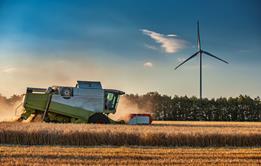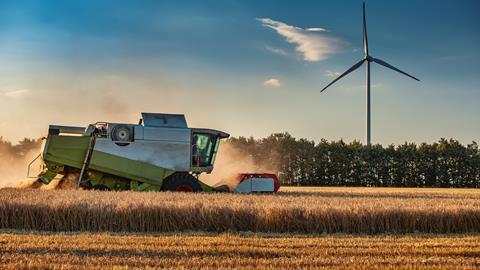In the latest in our power list series on women in grocery, we look at how greater gender diversity boosts environmental ambitions, and shine a light on the high-profile female talent that’s rising to the top
Elizabeth Nyamayaro was a young child in 1980s Zimbabwe when a sudden drought ravaged the country. “We went days without food,” she recalls. “At one point, I collapsed on the ground and thought I was dying.”
At the time, Nyamayaro – now an adviser to the UN’s World Food Programme – didn’t know the adverse weather was due to rising global temperatures. But she remembers that the women, who did most of the farming and water collection, were worst hit. Her observation is not unique, with a large body of research now suggesting women and girls bear the brunt of climate change in many of the world’s poorest areas. Over the years, Nyamayaro has also come to believe in a solution. “The one way we can change things is by having more women in leadership positions.”
Here again, she is not alone. Businesses with more women in managerial roles hold stronger climate policies, according to the Bank for International Settlements (BIS), who found that for every percentage point increase in female managers, businesses on average cut their CO2 emissions by 0.5%.
“The women in these positions are demonstrably proving their worth”
This is due to a phenomenon called “the greener attitude”, said the report, in which women are more inclined to foster a climate-conscious atmosphere because they are more likely to “consider overall societal wellbeing”.
“General socialisation theories show women have developed certain personality traits that they bring to the workplace. They are more ethical, more risk-averse, and less likely to underestimate the consequences of their actions,” explains co-author Giulio Velliscig. “At a corporate level this tends to lead to greener action.”
This translates not only to different attitudes, but different priorities, adds Barbara Bray, a food safety consultant who has worked in the agri-food sector in Europe and Africa for over 20 years. “Men tend to focus less on the environmental and social aspects of the business and more on the economic.”
This has been noticed by Liz Fox, Aldi UK’s corporate responsibility director, who agrees a greater proportion of women influencing sustainability decisions is “crucial to embedding it in business strategies”.
“I think people with an eye on the longer term – something I often see among my female peers – can bring so much to this area.”
Read more:
-
The 10 women blazing a sustainability trail in food, drink and retail
-
The 10 most powerful women in the UK’s supermarkets
-
The most influential women in grocery wholesale
-
The 10 most influential women in the world of discounting
Perhaps the ingredients that make up this “greener attitude” concoction are the reason why so many women occupy the relatively new position of chief sustainability officer (CSO), or adjacent roles like ‘corporate responsibility’ and ‘responsible sourcing’. Since Linda Fisher became the world’s first CSO at a publicly traded company in 2004, women have come to dominate the role, occupying 54% of CSO jobs in the US today. It’s seen too in the British food industry with the likes of Anna Turrell at Tesco, Rebecca Marmot at Unilever, or Virginie Helias at P&G.
“Once women are in these positions, they are demonstrably proving their worth not only to the organisation but to the wider environmental good,” says Carol Robert, COO at Suntory Beverage & Food.
The issue, however, is that often their influence is limited by the under-representation of women in other board positions, according to a Climate Action Gender Gap report by Oliver Wyman, which noted this trend is “constraining companies’ climate action”.
Why? One reason could be that many male leaders are “very worried about climate change behind closed doors” but still shy away from being vocal about it in a public setting because of outdated gender stereotypes, suggests WWF CEO Tanya Steele.
Needs and knowledge
More women in senior roles is one thing, but what about Nyamayaro’s initial observation in 1980s Zimbabwe that women are the ones on the sharp end of climate breakdown? Female farmers “make up the backbone of global agricultural supply chains” and so are the first to deal with the significant implications and risks of changing weather to food security, the IPCC said in its latest report. Incorporating women’s needs and knowledge into climate strategies is therefore an essential part of a ‘just transition’ towards a net zero world, it said.
This is increasingly recognised among major supermarkets and food manufacturers who are “well-placed to drive change because their influence touches all corners of the supply chains”, says Aldi’s Fox.
Aldi has launched women empowerment programmes for flower growers in Ethiopia, where it has invested £200,000 in education programmes aimed at enabling women to become leaders at work through mentorship and upskilling.
Waitrose too has recently conducted a gender-focused climate change report where it identified areas for improvement and pledged to support smallholder female suppliers.
However, this is not just the responsibility of retailers and suppliers. The impact of gender diversity inside companies is always boosted when women are also well represented outside their organisation, the BIS study showed. This means in parliaments, thinktanks, trade bodies, and world-leading policy organisations like the UN.
Here there’s a long way to go. At COP26 in Glasgow in 2021, less than 25% of all influential leadership positions were held by women. That included the UK, which was criticised for bringing a team with no women at all.
“It’s always been mind-blowing to me how women are the first-line responders when it comes to climate change yet don’t have a seat at the table at these high forums like the UN and COP,” says Nyamayaro.
She now recognises this as a familiar pattern across the board, from NGOs to international organisations to business.
“You don’t win by leaving your best players sitting on the bench,” she says. “You’ve got to put them in the game.”
A MESSAGE FROM THE SPONSOR
The Grocer’s previous power lists highlighted the positive impact of gender diversity on internal policy. But what about policies at a macro level? Could greater female influence at board level result in companies being more inclined to consider societal wellbeing too?

In short, the answer is yes. After the Paris Agreement, companies with a greater gender diversity saw a 5% greater reduction in their CO2 emissions compared with other businesses. And it’s not just in business either, with studies showing that countries with more women in parliament have stricter climate protection policies and lower carbon emissions.
Reading through the initiatives driven by this power list reads like an environmentalist’s dream manifesto for any company: net zero by 2040, waste reduction innovations, sustainability-led supplier collaborations (such as Tesco’s preferential rates for net zero suppliers), and end-to-end supply chain initiatives that bring environmental benefits across the entire food chain. The list is endless!
It’s no secret that having better ESG policies is better for business, with many seeing the dual benefits in their P&L as well as their ESG targets. So, if four months into the female power list series, we needed any more evidence about the importance, value and need to have gender-diverse teams, saving our planet has got to be right up there!
Emily Deer, Director at Newton Europe

Women’s power list: the leaders of grocery’s sustainability ambitions

In the latest in our power list series on women in grocery, we look at how greater gender diversity boosts environmental ambitions, and shine a light on the high-profile female talent that’s rising to the top
 Currently
reading
Currently
reading
Women’s power list: the leaders of grocery’s sustainability ambitions
- 2























No comments yet